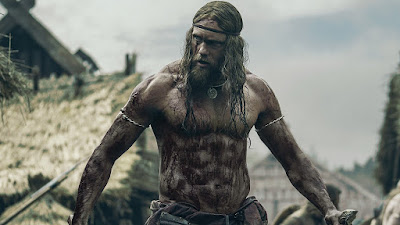Vikings have been the hot thing in various media for the past several years. From Michael Hirst's Vikings (now with a Netflix sequel, Vikings Valhalla) to The Last Kingdom to games like Raiders of the North Sea and Champions of Midgard. On the one hand, you could say that it's just an historical period that hasn't gotten as much exposure as many others and people jumped on the wave once it started forward. On the other hand, you could argue that some of the impetus may be coming from the surge in White nationalism that is on the rise in places like the US and Western Europe. (No, I'm not saying that just because someone makes a Viking movie or game that they're a White nationalist. Please save the outrage for something actually pertinent.) The latest entry in the cinematic field is Robert Eggers' The Northman.
When we first saw the trailer, it was intensely visually appealing. It was clear that a great deal of craft had gone into the lighting, costuming, and cinematography. This was a film that was fully immersed in the idea of the visual medium. The cynical side of me might suggest that that concerted focus was because there wasn't much of a story to back it up and they were trying to cover that fact with fancy visual effects and moments of shock to keep the audience interested at all. The screenplay is about as "stock Hollywood" medieval revenge fantasy as you can get. Son witnesses father die to usurper. Son spends decades with his rage keeping him alive. Son finally finds a way to try to avenge his father. Much blood happens. The end. There's a difference between "simple" and "simplistic." Rashomon is a simple story. The Northman is the latter and does not benefit for it. What happens in those instances is that any of the audience versed in either/both popular culture and/or adventure stories can immediately start drawing parallels to what has gone before. The scene where Amleth's (Alexander Skarsgârd) vengeance is set in motion is almost a carbon copy of the scene in Conan the Barbarian, where the latter is also set on the path of revenge. Amleth's muttering of how he'll avenge his father and save his mother to keep focused while rowing a boat out to (presumably) the North Sea is reminiscent of nothing so much as Arya Stark's list of people that she's going to kill. What results is that nothing in the film feels original. It feels like a pastiche of what Hollywood thinks a big budget Viking film should be.
Again, there's no arguing that the visuals are resplendent. From the vistas of Iceland and Scandinavia to the intensity on Amleth's face as he pursues his ultimate goal, the emotion and wonder are there in abundance. In that way, it's not dissimilar from Eggers' previous film, The Lighthouse, but the two scripts are completely night and day, with the latter presenting an opaque situation with plenty of mysticism and things to question, while this film is basically lifted right from an Icelandic saga, most of which were both linear and not too complicated by dint of the form and because they were preserved in the oral tradition. We've, uh, moved past that just a bit in the last millennium. Those intense visuals don't stop at the regular intervals of violence, either. My friend, Larissa, visibly flinched at several instances of blood showering this or that corner of the set, while I started raising an eyebrow at the absurdity of it all about halfway through the film. Yes, it was a violent era and a fairly violent culture at the time. But are you saying that your film is so linear that the only way to get through its 2+-hour running time is to follow that straight line through a sea of blood? Oh. I guess you are.
The performances were solid, such as they were. Anna Taylor-Joy is still a delight as Olga of the Birch Forest, while Nicole Kidman does a good turn as Queen Gudrún, Amleth's seemingly conflicted mother, although her role was as predictable to me as anything else about the film. I also liked Ralph Ineson (Dagmer Cleftjaw of GoT fame) in a bit role as the Rus captain who aids Amleth and Olga in their attempt to reach Iceland. And, of course, with many things Icelandic, Björk was involved and at least played an interesting version of herself as the Seeress of Amleth's dream-state. But none of that can cover for the fact that the initial story pitch had to comprise about 40 words, at best, and left me thinking of a half-dozen other films or TV shows, rather than the one right in front of me. I didn't get lost on the straight line. I just didn't feel like I should've bothered by the time I got off it.



No comments:
Post a Comment
Note: Only a member of this blog may post a comment.